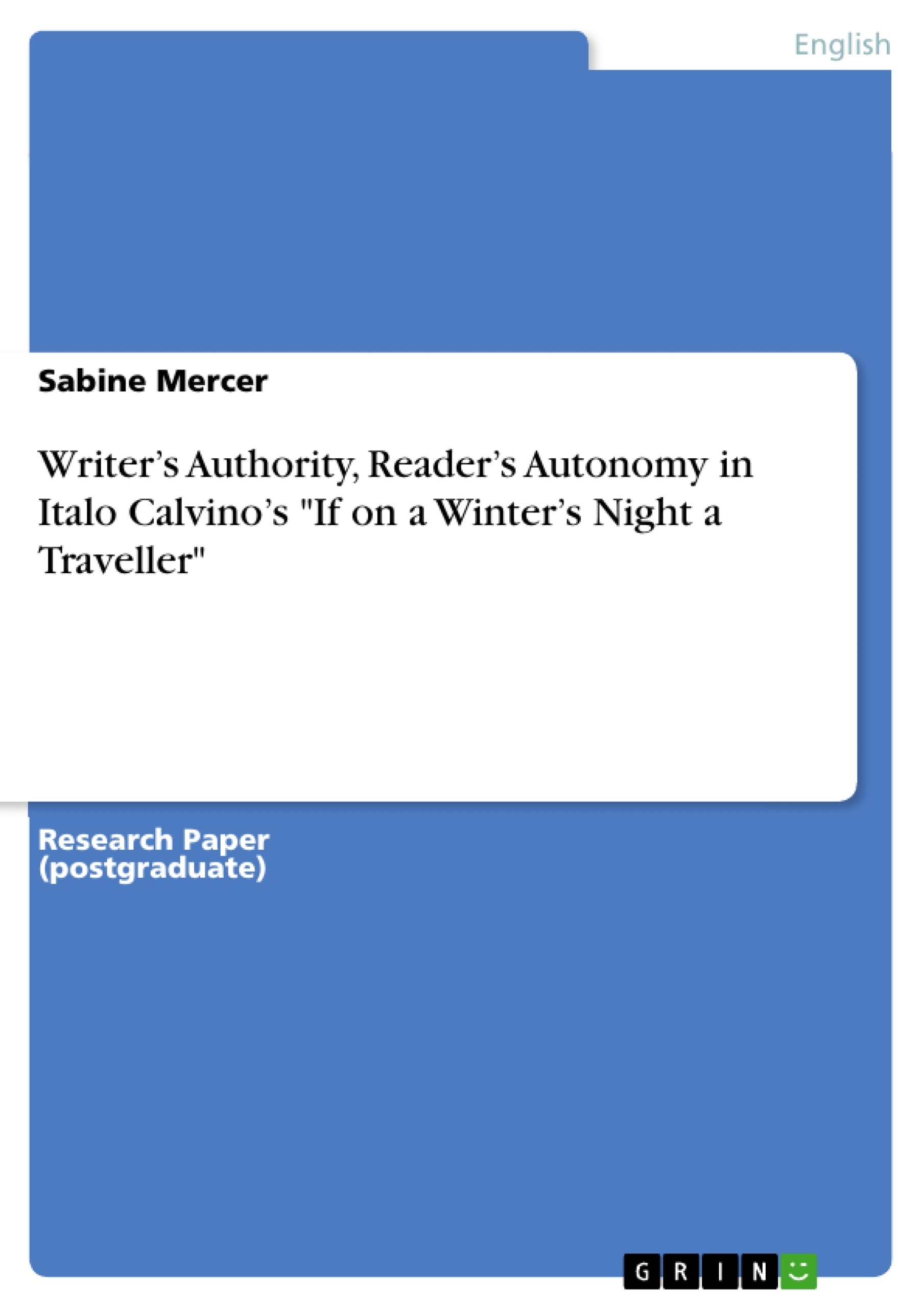In a close reading of “If on a Winter’s Night a Traveller” (1981), Mariolina Salvatori examines how Calvino’s meditation on writer's authority versus reader's autonomy – understood as a battle between production and consumption of text or, in common parlance, the experience and difficulties of writing a novel opposite reading one – influences our understanding of the text. Focussing on how framing devices affect the reading of the novel as a whole, Salvatori poses pertinent questions about readers’ autonomy.
The following essay follows up on her insights and proposes that within the novel is buried a stringent critique of postmodern theories, especially deconstructionism, that dominated literary discourse in the nineteen-seventies. At that time, postmodern theory stressed the role of the reader and critics assumed that reading creates meaning from the text, independent from writerly intention. If texts are said to have no inherent meaning, there follows the extreme conclusion that any text can mean anything, depending on the manner in which it is read.
One argument for reading Calvino’s novel in this manner is still prevalent: embedded in a novelty form of fictional arrangement, the book is preoccupied with the metaphysical struggle for dominance between supposedly antagonistic forces: readers and writers; literature and literary industry. By putting the case for each side, Calvino implicitly questions who is ‘master’ and who is ‘slave’ in the production and consumption of texts.
Following the postmodern transformation of an "authorial self" into a "textual self", the novel explores the relationships between readers, writers, their books and the ideas they engender, however ludicrous or possessive those ideas might play out. The plot is driven by the meditation on the nature of reading as much as on the nature of writing. Extremist attitudes regarding the production and consumption of books form the basis of an exploration of the general suggestion that there has been a reduction in the authority of the literary author. The ability of a writer to seduce and manipulate readers through a tightly controlled narrative strategy is examined to assess the extent of a reader’s autonomy. As a writer of fiction whose fiction is clearly about the writing of fiction, Calvino uses game-playing within the aegis of meta-fiction to demonstrate writers’ ability to exercise control by destabilizing the text and confusing readers.
Table of Contents
- INTRODUCTION
- Last Page: Where authorial Control ends.…....
- Projection of the Author: Silas Flannery ..
- Critique of the Culture Industry
- Power of Literature versus Poverty of Language.
- CONCLUSION
Objectives and Key Themes
This essay explores Italo Calvino's If on a Winter's Night a Traveller, analyzing the interplay between the writer's authority and the reader's autonomy. It examines how Calvino's novel challenges postmodern theories, particularly deconstructionism, and investigates the power dynamics between production and consumption of texts.
- The interplay between writer's authority and reader's autonomy
- Calvino's critique of postmodern literary theories, particularly deconstructionism
- The role of framing devices in influencing reader's understanding of the text
- The power dynamics between production and consumption of texts
- The nature of reading and writing as explored through the novel's metafictional elements
Chapter Summaries
The Introduction delves into Calvino's meditation on the relationship between writer and reader, arguing that the novel implicitly critiques postmodern theories prevalent in the 1970s. It highlights the novel's preoccupation with the struggle for dominance between readers and writers, and the importance of the reader's role in shaping meaning.
The "Last Page: Where authorial Control ends.…...." section discusses the novel's exploration of the relationships between readers, writers, their books, and the ideas they engender. Calvino's use of juxtaposition and metafiction is examined, demonstrating how writers can exercise control by destabilizing text and confusing readers.
The "Projection of the Author: Silas Flannery .." section focuses on the novel's portrayal of two fictional writers: Silas Flannery, a self-torturing novelist seeking to write the ultimate book, and Ermes Marana, a deceptive translator who creates pastiches. Both characters embody the writer's desire for control and the anxieties associated with reader expectations.
The "Critique of the Culture Industry" section explores Calvino's fascination with the process of storytelling and its power to negotiate "reality." The novel's metafictional plot is structured around conventions of romance and detective stories, engaging readers in the quests of the unnamed "Reader" and "Other Reader," Ludmilla.
Keywords
The primary focus of the essay is on the relationship between writer and reader in Italo Calvino's If on a Winter's Night a Traveller. Key terms include: writer's authority, reader's autonomy, postmodern theory, deconstructionism, metafiction, framing devices, narrative strategy, and the power dynamics between production and consumption of texts.
- Quote paper
- Dr. Sabine Mercer (Author), 2012, Writer’s Authority, Reader’s Autonomy in Italo Calvino’s "If on a Winter’s Night a Traveller", Munich, GRIN Verlag, https://www.grin.com/document/431158



